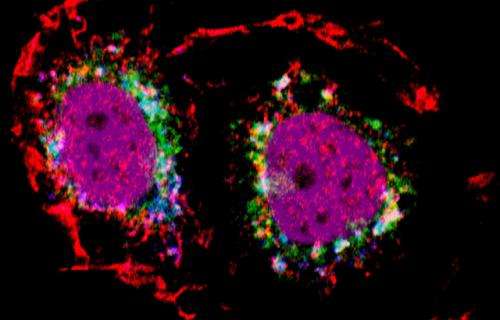Scientists discover new mechanism which causes the spread of breast cancer

(Medical Xpress)—Scientists at Queen Mary University of London (QMUL) have uncovered a new mechanism which makes breast cancer cells move and invade the body, a discovery which could shed light on how to treat particularly aggressive forms of breast cancer and stop it spreading and recurring.
The study – published in the journal Nature Communications and led by QMUL's Barts Cancer Institute – investigated the role of a molecule called 'c-Met' which is present in almost a third of breast cancer patients and is known to make breast cancer cells move, and therefore spread, around the body. This process is known as metastasis and is a major cause of treatment failure and cancer death.
When looking at aggressive breast cancer cells, the researchers found that c-Met acted differently to normal and 'switched on' another important molecule (known as 'Rac'), from a specific location inside the cell, instead of from the cell surface, as previously thought. This signalling inside the cell is necessary to trigger the cancer cells movement.
Drugs or genetic means can block the entry of c-Met in the breast cancer cells or stop Rac being switched on in the discovered specific cell location, thus stopping the mechanism from being triggered and causing cell movement. These results suggest that new treatments based on the discovery of this mechanism may be designed to treat breast cancer patients who do not respond to current therapies.
Dr Ludovic Ménard, lead author, Queen Mary University of London, Barts and The London School of Medicine and Dentistry, comments: "There is an urgent need to find new therapies for breast cancer. Some patients develop resistance to existing treatments and other very aggressive forms of breast cancer still have no effective therapy options. The discovery of this new mechanism could be key in helping us develop new treatments by stopping the spread and invasion of cancer cells to other parts of the body."
Dr Stephanie Kermorgant, Project Supervisor, Queen Mary University of London, Barts and The London School of Medicine and Dentistry, comments: "The role of the receptor 'c-Met' in relation to breast cancer is already widely acknowledged, with pharmaceutical companies looking to generate drugs against it. However, the discovery of how this receptor interacts with other key molecules to trigger cell movement is a new finding and could play a huge role in future research. We would like to carry out further studies which fully investigate the benefit of targeting the newly discovered mechanism, in the hope of uncovering new options for targeted breast cancer therapies."
More information: "Receptor tyrosine kinase c-Met controls the cytoskeleton from different endosomes via different pathways." Ludovic Ménard, et al. Nature Communications 5, Article number: 3907 DOI: 10.1038/ncomms4907. Received 06 August 2013 Accepted 17 April 2014 Published 19 May 2014
















